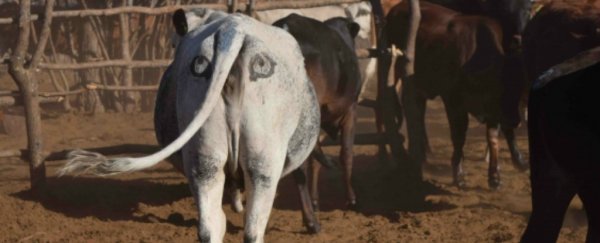Scientists have come up with a solution that will reduce the number of lions being shot by farmers in Africa - painting eyes on the butts of cows.
It sounds a little crazy, but early trials suggest that lions are less likely to attack livestock when they think they're being watched - and less livestock attacks could help farmers and lions co-exist more peacefully.
The new technique is being tested by scientists from the University of New South Wales (UNSW) in Australia, after they noticed that lions tended to back off when their prey, such as impala, looked at them.
"Lions are ambush hunters, so they creep up on their prey, get close and jump on them unseen," said Neil Jordan, a conservation biologist from UNSW, describing the first time he noticed the behaviour.
"But in this case, the impala noticed the lion. And when the lion realised it had been spotted, it gave up on the hunt."
The use of fake eyes is found throughout nature as a way to repel predators - just think of butterflies, who can often have wing patterns that look like eyes to ward off predators.
But it's not something that's been done with larger predators before - and alternatives are definitely needed. There are now estimated to be between 23,000 and 39,000 African lions left in the wild, and they're listed as vulnerable on the IUCN Red List of Threatened Species.
But despite their conservation status, SAVE Wildlife Conservation Fund cites farmers killing lions in retaliation as one of the biggest threats to the species.
"As protected conservation areas become smaller, lions are increasingly coming into contact with human populations, which are expanding to the boundaries of these protected areas," said Jordan.
If we could find a way to prevent lions from killing livestock in the first place, we will hopefully make farmers more accepting of the predators, and more open to living alongside them peacefully.
So could this simple solution work? Jordan and his team have already had positive results in a small trial in Botswana last year.
When the researchers stamped painted eyes onto a third of a herd of 62 cattle, and counted the returning cows over a 10-week period, no painted cows were killed by lions, while three unpainted cows were.
Jordan admits that the sample size is too small to rule out chance in this experiment, but his team will be returning to Botswana in July for a further three-month test.
Using the science crowdfunding platform, experiment.com, Jordan has been able to purchase 10 cattle GPS loggers, and a GPS lion radio collar. The GPS devices will give more indication of the movements of both cattle and lions, and hopefully determine where they meet, and how the painted eyes change their behaviour.
"This will give us information about the exposure of painted and unpainted cows to predation risks, and where the conflict hotspots are," said Jordan.
As weird as it may be, we're all for painting cows' butts if it helps save farmers livelihood, and protects endangered African lions.
UNSW Science is a sponsor of ScienceAlert. Find out more about their world-leading research.
